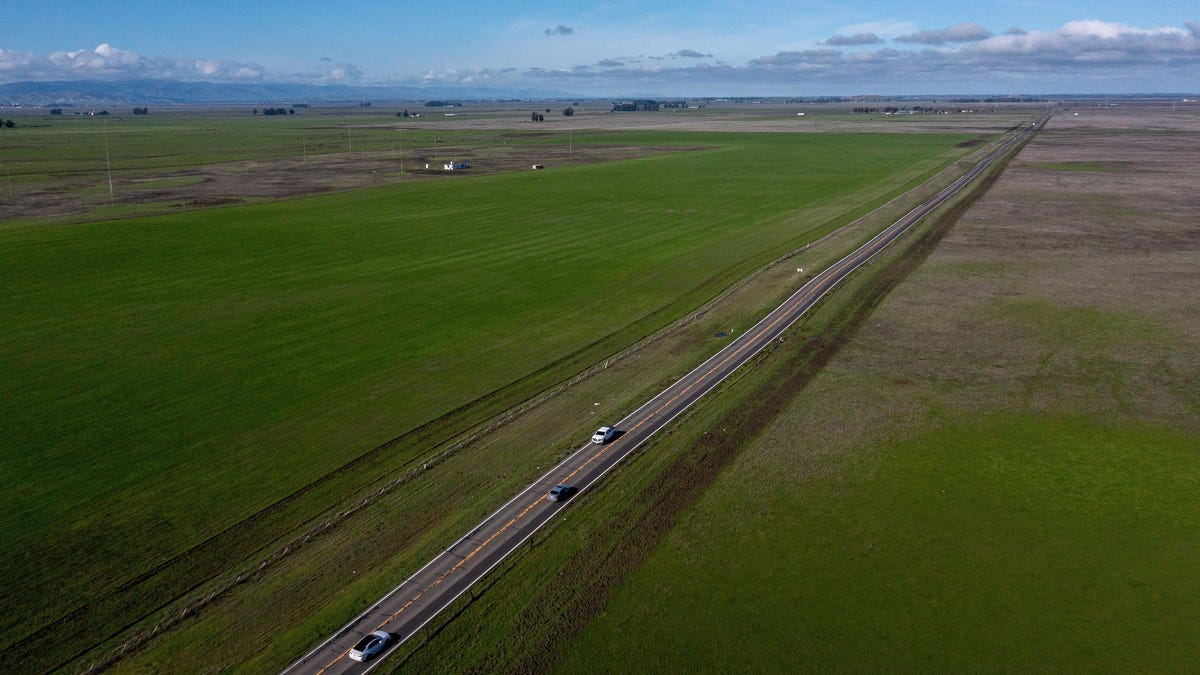
[ad_1]
From the moment I heard about tech billionaires’ weird plans to create a bustling new city in the heart of California’s Solano County, I was preoccupied with one basic question: Who is actually going to run this thing?
Libertarian dreams of creating a new community from scratch are all well and good but, at the end of the day, you can’t operate a municipality of any real size without a team of boring, dysfunctional bureaucrats to decide what the local zoning laws are and how to spend the tax dollars. Bulldozers and construction workers could, hypothetically, build a bunch of new buildings, sure, but it wasn’t immediately apparent—at least not from the statements made by the project’s backers—who would be in charge of the city once it was actually built.
Early on, California Forever made it known that they had some pretty radical ideas about how to run a city. Developers let it slip that they wanted to fund the community entirely through private sector money and that the whole urban project was viewed, more or less, as a business opportunity. From these statements, it didn’t seem out of the realm of possibility that the city would be some terrible, dystopian version of Disney’s Storyliving, where a company effectively called the shots and residents were just passive prisoners inside its overly priced walls. The question of how the city would be run was an open one, with more than a few unappealing answers.
Now, however, it appears that this pivotal question has been answered: California Forever’s new city will not have a local government at all. Instead, the developers plan to keep their new urban hub as an unincorporated area and leave the governing to the pre-existing county government that already controls the region. In a recent interview with YIMBY (“Yes In My Backyard” ), an online outlet that promotes development in the Bay Area, California Forever’s Head of Planning, Gabriel Metcalf, revealed that there would be no local government to regulate the activity within the city’s borders:
YIMBY: So, there won’t be any kind of local government that runs this city apart from the county government?
Gabriel Metcalf: Yes, our intention is to remain part of unincorporated Solano County. So, the political body that will have jurisdiction is the county board of Supervisors. We’ll have a very close cooperative working relationship with the county to provide police and fire services, all the services, and work on economic development projects together. I expect we’ll be very close partners.
This is interesting—and not unprecedented. There are a lot of unincorporated territories throughout the U.S. Many of them are small, impoverished communities, though there are a number of large and thriving metropolitan areas that are unincorporated and that, similar to California Forever’s hypothetical city, rely on the county government for regulation.
Yet if there is some precedent to the new city’s proposed governmental organization, it does beg a lot of questions about how the project will actually function. If the Solano County government is suddenly beset with vast new responsibilities and has to help regulate every part of a blossoming (and, likely, chaotic) city-building process, how will the extant bureaucracy handle that? And, as the city develops and becomes populated, won’t the county’s resources be stretched thin—particularly in how it relates to essential services, like police and firefighters—with a special preference for the new community?
In his interview with YIMBY, Metcalf revealed another interesting aspect of the project, which is that residents of the new city (and Solano County writ large) don’t really have much of a say in the direction of the new community. When asked about how county voters would be able to maintain some kind of “checks and balances” over the new development, which is expected to take 40 years to effectively mature, Metcalf replied:
There are two primary ways that voters in Solano County maintain democratic oversight. One is the terms of the voter initiative themselves, which are legally binding. Those have been developed through intense consultation with the people and elected leaders in the county. It includes funding commitments, a zoning envelope, and a development footprint. So, all of that is locked in by a vote of the people.
In other words, whatever is inside the ballot initiative (which voters will vote on in November) is what will come to pass. But Metcalf had more to say:
The second main way voters in the count will exert control is through the terms of the development agreement. After our process and the voter initiative, we do a full EIR (Environmental Impact Report) and then negotiate a development agreement with the county board of supervisors. A development agreement is a voluntary contract in which both parties can agree to whatever they choose.
In other words, voters won’t really have that much control over this development at all. If county residents vote for it, they will get whatever is in the ballot initiative. The development agreement, meanwhile, will be hashed out between the county board of supervisors and the company. A lot of the rest of this scenario—and the way everyday people fit into it—remains something of an open question.
[ad_2]
Source link






